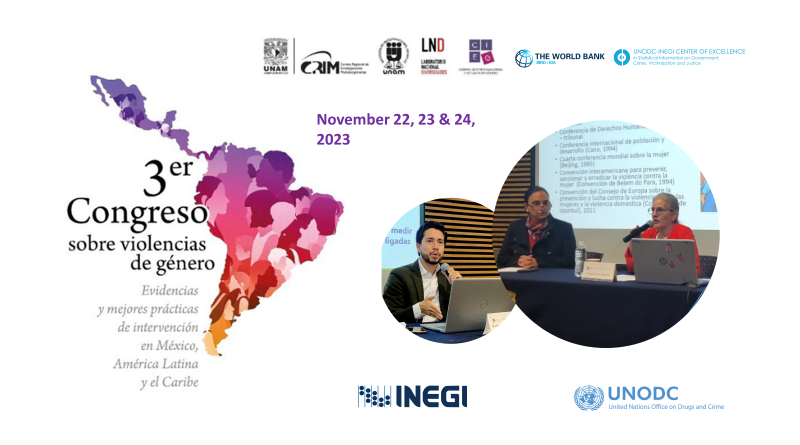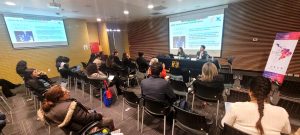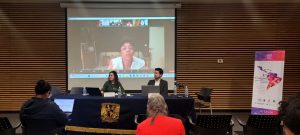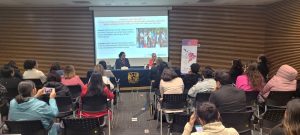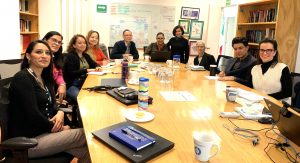3rd Congress on gender-based violence: Evidence and best practices of intervention in Mexico, Latin America and the Caribbean
Mexico City, 27 November 2023. From 22 to 24 November, the UNODC-INEGI Center of Excellence (CoE) participated as co-convener (in parallel with the World Bank) in the 3rd Congress on Gender Violence: Evidence and best practices of intervention in Mexico, Latin America and the Caribbean, organized by the Regional Center for Multidisciplinary Research (CRIM) of the National Autonomous University of Mexico (UNAM). The Congress was held in hybrid form at the UNAM Convention and Exhibition Center, located in Mexico City.
Gender violence is part of an unfortunate reality. UNODC firmly believes that gender equality and integrating a gender perspective must be part of how programmes and projects are designed, implemented, monitored and evaluated. Understanding the interrelationship between gender and transnational organized crime, drug-related policies, counterterrorism and corruption is vital in order to ensure that policies, programmes and actions to address these are effective for the population as a whole.
In this context, the 3rd Congress on Gender Violence is conceived as an academic effort to make visible and understand the factors associated with the different forms of gender violence from an intersectional, human rights and gender perspective.
During the Congress, the UNODC-INEGI Center of Excellence had 3 interventions:
- We participated in the opening ceremony, where we shared the table with other areas of UNAM such as Humanities, the Center for Research and Gender Studies (CIEG) and the Institute for Legal Research, as well as with the World Bank. The Coordinator of the CoE, Ms. Adriana Oropeza, emphasized that “the gender perspective in statistics is not an option, it is a priority”.
See the recording: https://youtu.be/xlW_znAOhgc
- We organized the Panel “How to measure gender-related killings of women and girls in a standardized way? Statistical Framework for Measuring Femicide/Femicide”, where we presented the latest global estimates of female/family-member related homicides and the UNODC Statistical Framework for Measuring Femicide. Expert Saide Mobayed, Researcher at the University of Cambridge, also participated and presented a global overview of the challenges in measuring this phenomenon. Finally, the National Institute of Statistics and Census of Ecuador, through Ms. Veronica Cuzco, shared a country experience on the challenges and opportunities for the measurement of femicide at the national level. The panel was moderated by Ms. Gina Andrade Baena, IADB Gender and Diversity Division
See the recording: https://youtu.be/b1K-vtaMlXI
UNODC-INEGI CoE UNODC-CRIM_RMH
Saide Mobayed presentation
Verónica Cuzco presentation
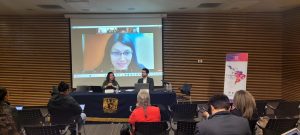
- We moderated the closing keynote speech where we invited Ms. Claudia García Moreno, retired WHO specialist, who shared a broad overview of the history of measuring violence against women from the field of health and the tools and data available today.
See the recording: https://youtu.be/huc2s_pOZZY | Presentation
In parallel, in the framework of the invitation to Ms. Claudia García Moreno to Mexico, and in collaboration with the National Institute of Statistics and Geography INEGI of Mexico, we organized a working meeting on Monday, November 27th at the UNODC-INEGI Center of Excellence facilities, where we discussed the aspects to be evaluated of the National Survey on the Dynamics of Household Relationships (ENDIREH) 2021. During the meeting, the specialist provided recommendations on operational and conceptual aspects to be adopted in the ENDIREH according to her experience in the implementation of this type of specialized surveys at the international level. The need to update international and regional tools regarding its implementation was also discussed. This meeting was organized in collaboration with the Deputy Directorate General (DGA) of Indicators of INEGI’s General Directorate of Government, Public Security and Justice Statistics, headed by Ms. Alejandra Ríos, with the participation of specialized technical staff from the same area.
Through these events and meetings, UNODC, through the CoE, promotes collaboration not only among justice, security, and official statistics institutions, but also with other international organizations, academia and civil society in the Latin American and Caribbean region. It also contributes to the achievement of Sustainable Development Goals (SDGs) 5: Gender Equality; 11: Sustainable Cities and Communities; 16: Peace, Justice and Institutions.



